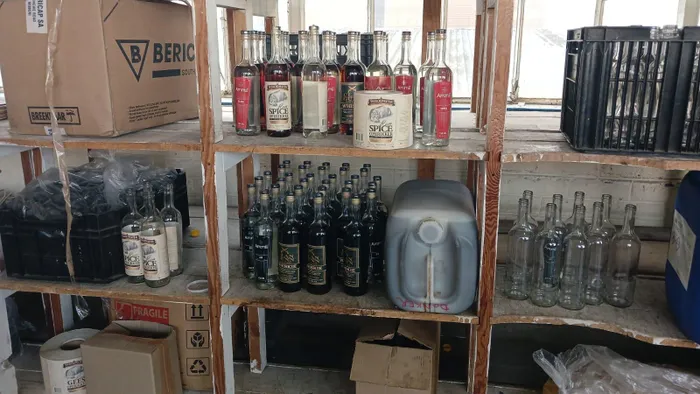
Gauteng police recently acted on a tip-off, leading to the closure of an illegal alcohol manufacturing facility in Jeppestown.
Image: Gauteng SAPS/X
The escalating crisis of counterfeit goods in South Africa has intensified calls for urgent measures to combat organised crime, following a series of high-profile arrests linked to illicit alcohol trade syndicates. Recent statistics reveal a staggering 55% increase in illegal alcohol volumes since 2017, prompting officials and activists alike to classify the situation as a national crisis.
Last month IOL reported that the Drinks Federation of South Africa (DF-SA) found that the volume of counterfeit alcohol in the country reached 773 000 hectolitres in 2024.
This surge has coincided with several police operations aimed at dismantling the networks behind these illegal products after Gauteng police, on Monday, acting on a tip-off conducted a raid in the city centre which led to the closure of an illegal alcohol manufacturing facility in Jeppestown.
During this operation, authorities uncovered millions of rands worth of counterfeit alcohol, including fake whiskey, vodka, and gin, as well as counterfeit labels and packaging worth R3.5 million. Colonel Dimakatso Nevhuhulwi of the Gauteng police confirmed that six suspects were arrested, including a man who presented a dubious liquor license from Mpumalanga.
"Upon arrival at the said premises, the team was met by a man who claimed to be the owner of the business and further produced a liquor license which was for a Mpumalanga-based establishment. Following a search of the property, the team discovered the manufacturing and production of whiskey, vodka, and gin, including the reprint of counterfeit labels and packaging," stated Nevhuhulwi.
At the weekend, police in Bloemfontein in the Free State confirmed the arrest of six foreign nationals after confiscating counterfeit goods valued at more than R19 million during raids in the CBD. Reacting to the raids in the Free State, National police spokesperson, Amanda Van Wyk, revealed that the search and seizure warrants were executed in accordance with the Customs and Excise Act at targeted shops.
The arrests in Bloemfontein and Johannesburg were preceded by the arrest of a 31-year-old man who was arrested last week for allegedly manufacturing and illegally distributing counterfeit alcohol at his home in Klaarwater, Mariannhill, west of Durban.
During the raid, KZN police confiscated counterfeit vodka with a street value of R250 000, which was found being manufactured at the site.
At the time, police spokesperson Captain Carmen Rhynes indicated that members of the provincial organised crime, the provincial drugs and firearm unit, and the provincial counterfeit goods unit were instrumental in the arrest.
"Members of the Provincial Organised Crime Unit (Narcotics), assisted by the Provincial Drug and Firearm Unit and the Provincial Counterfeit Goods Unit, acted on intelligence-driven information regarding the manufacturing and illegal distribution of counterfeit alcohol, specifically vodka, in the Klaarwater area in Mariannhill, Durban. They executed a search warrant at the identified premises and a suspect of 31 years of age was found on site and placed immediately under arrest for the contravention of the Liquor Act and the Counterfeit Goods Act," Rhymes said.
Reacting to the latest incidents of illicit proliferation of counterfeit booze, anti-crime activist Yusuf Abramjee said that SARS estimates the proliferation of illegal alcohol costs the country's economy over R11 billion in lost annual excise tax revenue.
"The illicit alcohol trade is completely unregulated, and apart from the massive revenue losses, this leads to numerous social issues. People are being sold dodgy alcohol that potentially contains fatal ingredients. It isn’t regulated, and criminals don’t care what they’re selling as long as they make a profit. Meanwhile, criminals are stealing the taxes that are meant to pay for vital services such as schools, hospitals, and housing," Abramjee stated.
Abramjee has attributed the increase to a lack of stringent law enforcement efforts within and across SA borders, which he said contributes directly to the flows of illicit goods on the back of the recent COVID-19 pandemic which destroyed various industries.
"The main problem is the lack of adequate enforcement by authorities and a growing lack of faith in the rule of law. Between 2016 and 2019, just R26 million worth of alcohol was seized by SARS. Since then, the sales bans imposed during the COVID-19 pandemic have entrenched illicit networks. The SA Liquor Board Association (SALBA) estimates that more than one in five bottles sold in SA is illicit. The problem is even worse in the tobacco industry, as illicit cigarettes are even easier to distribute and trade illegally," he added.
Cape Times